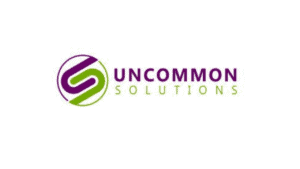Are you looking for help expanding your sales force to reach revenue targets? Do you need an objective, outside perspective on your sales process? Are you ready to improve your sales strategy but unsure where to start? If so, you may want to consider hiring a sales consultant.
Sales consulting is a field that involves helping large and small businesses and entrepreneurs expand their sales reach and increase their profits. But what does a typical sales consultant do, how can they help a business grow, and how do you pick the right consultant for your business?
What is Sales Consulting?
Sales consulting is a type of business advisory that focuses on helping organizations develop strategies to grow their businesses. Sales consultants are experts in the field of sales; they work closely with clients to identify opportunities and challenges, provide advice and guidance, and then recommend solutions to those issues. This can include developing sales strategies, teaching sales techniques, providing ongoing coaching to sales reps and sales leaders, and helping you understand the psychology of selling and how to better connect with your customers. Sometimes, a sales consultant may be brought in as a Sales Manager for an organization’s entire sales operation.
A great sales consultant can transform businesses by taking a strategic, analytical, and creative approach to sales. First, they will work with you to understand what’s working and what’s not and where you want to be. Then they will develop a sales approach tailored to your specific needs and goals and combine that with sales coaching and training. When you work with a great sales consulting firm, you get a customized sales consulting experience that can help transform how your organization navigates sales, sales leadership, and sales-specific hiring processes.
The Different Types Of Sales Consulting Services Available
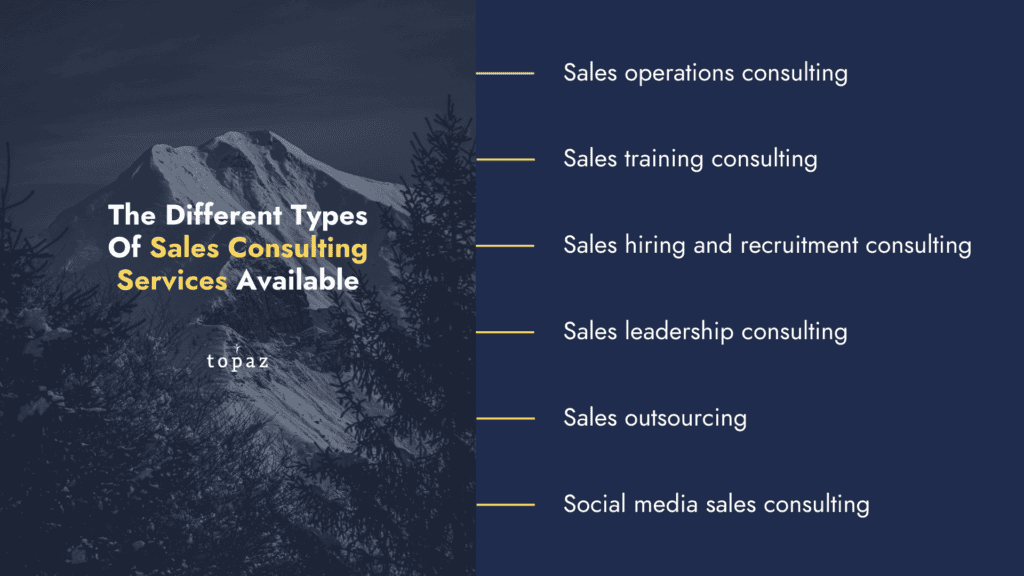
Sales consulting services come in many different shapes and sizes. Most businesses will offer various services, such as training programs, strategy development, and lead generation. However, there are also a number of specialized services that can be helpful for businesses looking to improve their sales process. A few examples include:
- Sales operations consulting: This type of consulting can help businesses optimize their sales process and improve efficiency. Services may include process redesign, performance tracking, and sales automation.
- Sales training consulting: When focusing on improving the effectiveness of a company’s sales team, sales training consultancies include training and development programs, one-on-one and/or team coaching, and performance benchmarking.
- Sales hiring and recruitment consulting: Companies specializing in sales hiring consulting help businesses find and hire qualified sales staff members. Services typically include assessment, recruiting, and selection support.
- Sales leadership consulting: Companies that offer sales leadership consulting services equip sales leaders, managers, and rising stars with the tools to help them build and lead high-performing sales teams to consistently exceed sales goals, attract top performers, and win against the competition.
- Sales outsourcing: This type of service involves contracting out certain aspects of the sales process to a third-party provider. Services may include lead generation, market research, or telesales.
- Social media sales consulting: A newer phenomenon that is quickly gaining popularity. This type of consulting is done via social media platforms such as Facebook, Twitter, LinkedIn, and Instagram. The consultant will help the client to develop a presence on these platforms and then use that presence to drive sales (also commonly referred to as social selling), which can be an extremely effective way to reach new customers and grow a business.
The Modern Shift in Sales Consulting
The sales playbook just got a rewrite. AI, LinkedIn prospecting, hybrid selling, and remote buyers have flipped the old rules on their head. The winners? Teams that blend technology with curiosity and make every interaction count.
Sales consulting today isn’t just about refining talk tracks and closing techniques. It’s about mastering a new blend of tools, tactics, and timing. The rise of AI, the expansion of hybrid selling, and the reality of remote buyers are reshaping the sales landscape at a pace we haven’t seen before. The teams that thrive are the ones that adapt quickly without losing their human edge.
Here’s what’s driving the shift
- Remote buyers with higher expectations – Meeting buyers where they are, on their time and platform of choice, while keeping experiences personal and relevant.
- AI as a creativity multiplier – Mining LinkedIn for high-fit prospects, generating pain questions tailored to each buyer, and crafting crisp, credibility-building intros for outreach.
- Hybrid selling as the norm – Blending video calls, quick LinkedIn messages, and in-person meetings while showing up equally strong in both worlds.
This is where a milestone-centric sales process proves its value. It helps teams blend digital and human interactions seamlessly. At the same time, a participatory learning approach ensures salespeople don’t just memorize scripts but build the real-time adaptability to navigate shifting buyer expectations with confidence.
AI can accelerate preparation, but it’s your team’s ability to ask the right questions, adapt to the moment, and guide buyers toward confident decisions that will win the deal. Sales consulting has always been about improving performance. Today, it’s also about helping teams integrate technology, creativity, and human connection into a unified approach that keeps pace with a modern, ever-shifting market.
What is a Sales Consulting Firm?
A sales consulting firm specializes in helping businesses improve their sales strategies, processes, and outcomes. These firms employ experts in sales and marketing (sales consultants) who analyze a company’s current sales practices, identify areas for improvement, and develop customized solutions to enhance sales performance. This can include training sales teams, implementing new sales technologies, optimizing sales funnel strategies, and improving lead generation and conversion rates.
Sales consulting firms aim to boost their clients’ sales efficiency and effectiveness, ultimately increasing revenue and driving business growth. They work across various industries, offering tailored advice and strategies based on the specific challenges and goals of each client. Sales consulting firms are pivotal in transforming sales teams into productive, record-earning organizations. Leveraging their expertise, sales consultants provide services to enhance sales performance, streamline processes, and foster growth.
Top 5 Ways a Sales Consulting Firm Helps Its Clients
- Build Strategies That Actually Fit
Develop sales strategies aligned with business goals, market realities, and the unique value you bring—covering everything from target markets to sales targets to messaging that resonates. - Streamline the Sales Process
Refine and simplify the sales process so everyone follows the same playbook. Implement best practices that shorten cycles, improve conversion rates, and make every step intentional. - Elevate Skills with Targeted Training
Deliver tailored, participatory sales training and coaching that sharpens prospecting, pain discovery, and closing skills while encouraging critical thinking and adaptability. - Strengthen the Tech Backbone
Select, implement, and optimize CRM and sales tech so teams track, analyze, and manage customer interactions efficiently—turning data into action. - Recruit and Develop Top Talent
Use specialized sales hiring processes to find the right people for the right roles, then develop their skills so they succeed long-term and fit the company culture.
A sales consulting firm, a trusted advisor and expert, can provide invaluable support and expertise to sales teams looking to grow their revenue-generating machine.
How Does Sales Consulting Work?
A sales consultant provides analysis and recommendations to clients to help them improve their sales performance and close more sales. The role of a sales consultant can vary depending on the client’s needs, but generally, they will provide expert advice on sales strategies, techniques, and processes. They may also conduct training sessions or workshops to help sales teams learn new skills and strategies.
Sales consultants can also develop marketing plans and identify new business opportunities. Depending on the sales consultant you partner with, they may provide support during the sales process, such as helping negotiate deals or providing customer service.
Sales consultants exist to alleviate any pain or problems your organization is experiencing regarding sales. Here’s a list that should help you better understand where you can benefit from working with a sales consultant.
Top 10 Pain Points a Sales Consultant Can Help Make Go Away
Most companies don’t hire a sales consulting firm because things are going great. They bring one in when deals stall, talent underperforms, or the process breaks down. Here are ten of the most common pain points and how the right consultant can turn them into strengths.
- Unclear Sales Strategy
Many teams chase opportunities without a focused plan. A sales consulting firm creates strategies aligned with business goals, market realities, and the company’s unique value. - Inconsistent Sales Process
When every rep sells differently, deals fall through the cracks. Consultants streamline the process so everyone follows the same, effective playbook. - Long Sales Cycles
Bloated, unstructured sales stages slow momentum. A refined process shortens cycles and keeps deals moving toward a close. - Low Conversion Rates
High activity means nothing without results. Consultants identify where leads stall and fix the steps that hurt conversions. - Skills Gaps on the Team
Reps often struggle with prospecting, pain discovery, or closing. Tailored, participatory training builds these skills while promoting adaptability and critical thinking. - Weak Use of Technology
CRMs and sales tools often go underutilized. Consultants help teams choose, implement, and fully leverage tech to track, analyze, and act on data. - Hiring the Wrong People
Bad sales hires are costly. Specialized sales hiring processes ensure candidates have the skills, mindset, and cultural fit to succeed. - Lack of Sales Coaching
Managers may track numbers but miss coaching moments. Consultants instill a coaching culture that drives long-term performance. - Poor Pipeline Visibility
Without clear forecasting and KPI tracking, leaders make decisions in the dark. Consulting brings clarity to metrics and performance management. - Misaligned Compensation Plans
If the pay plan doesn’t reward the right behaviors, performance suffers. Consultants design incentives that motivate and align with company goals.
Building a sales engine that runs smoothly, scales easily, and wins consistently requires fixing these pain points.
If you’re interested in learning more about our programs or speaking directly with a member of our team, contact us and give us the opportunity to get to know your company and your unique needs and goals.
How Sales Consultants Help Your Business Grow
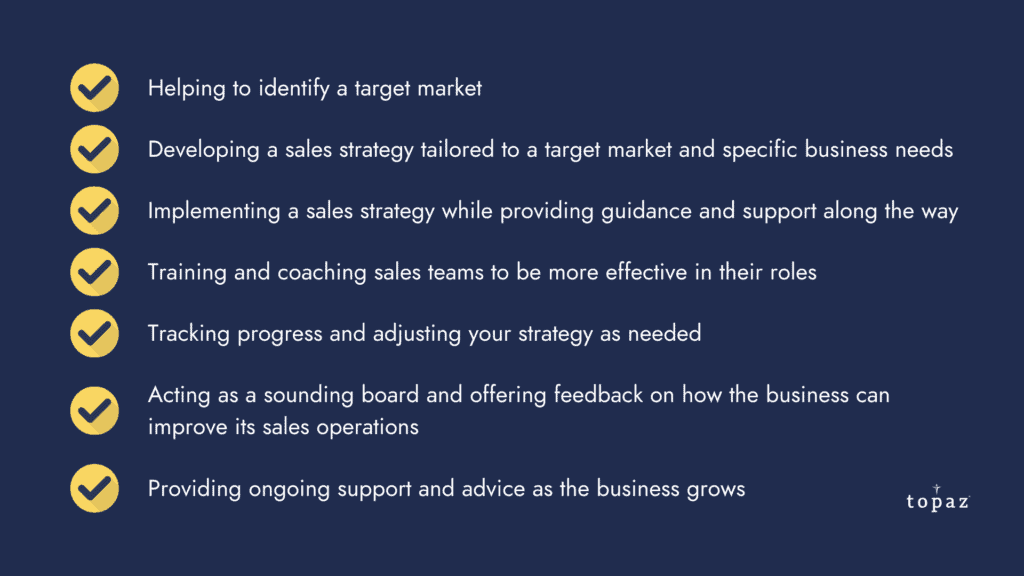
Sales consultants bring a wealth of experience, knowledge, and expertise. They offer an objective perspective on your business and can identify areas for improvement that you may have yet to consider. By taking the time to understand your sales strategy, processes, and team dynamics, a sales consultant can provide valuable insights on how to optimize and grow your business.
Plus, sales consultants can provide training (digital or in-person) programs to address your organization’s specific needs and goals. This can help improve the skills and techniques of your sales team, leading to better performance and increased revenue.
By utilizing the skills and expertise of a sales consultant, businesses can unlock new growth opportunities and realize their full potential. A sales consultant can help companies to grow in several ways, including:
- Helping to identify a target market
- Developing a sales strategy tailored to a target market and specific business needs
- Implementing a sales strategy while providing guidance and support along the way
- Training and coaching sales teams to be more effective in their roles
- Tracking progress and adjusting your strategy as needed
- Acting as a sounding board and offering feedback on how the business can improve its sales operations
- Providing ongoing support and advice as the business grows
Ultimately, a sales consultant is crucial in helping your business succeed by providing valuable guidance, support, and training to improve your team’s performance and grow your bottom line.
At Topaz, we offer a range of services to help businesses grow, including:
- Metahire Sales Hiring System is a one-of-a-kind hiring strategy that empowers you to find and hire your ideal sales talent
- Buyer Facilitator Sales Training and Coaching, which teaches you how to optimize the sales process
- Sales Leadership Development, which provides training, guidance, and support for anyone who manages sales teams
Sales Effectiveness Self-Assessment
Where is your sales team right now? Use this quick sales assessment to spot your team’s strengths and what’s slowing down growth. No fluff. Just honest reflection.

If you’re seeing more “low” and “medium” than you’d like, don’t view it as a crisis but an opportunity. Find a sales consulting firm to help you recalibrate with purpose.
Why Should You Hire a Sales Consultant?
Sales consulting services come in many shapes and sizes and can be an invaluable resource for any business looking to expand. Most companies offer various services, such as training and coaching programs, strategy development, and lead generation.
So, how do you know you need a consultant? The first step is to take a sales performance assessment to determine your specific needs and identify whether you really need help.
If you have concluded that you cannot achieve your goals with the current resources and expertise you have, you might benefit from getting consulting help. Then, assess your readiness. Is improving your sales a high priority? Do you have the time, money, and resources to invest?
There are several reasons why hiring a sales consultant might make sense for your company. A great sales consultant can:
- Meet you where you are to learn about your business, opportunities, and goals, uncover your most significant challenges of getting there, and build a sales organization geared for long-term success and increase your company’s bottom line.
- Give your sales team the skills and tools to close more sales and exceed their sales goals.
- Use objective assessments to help you understand the strengths and weaknesses of the entire sales team.
- Implement a sales hiring process to attract top performers and become a team of winners.
- Develop crucial sales leadership skills to motivate, hold your sales team accountable, and implement a sales process followed by all.
These benefits are the top reasons to consider when contacting a sales consulting firm. And, if you haven’t considered working with a sales consultant, you’re encouraged to reach out and speak with several sales consultants about how they can help your business.
Want to stay in touch with the Topaz Sales Consulting team? Subscribe to our quarterly newsletter to hear major updates in the sales and hiring industries.
Finding Your Ideal Sales Consultant
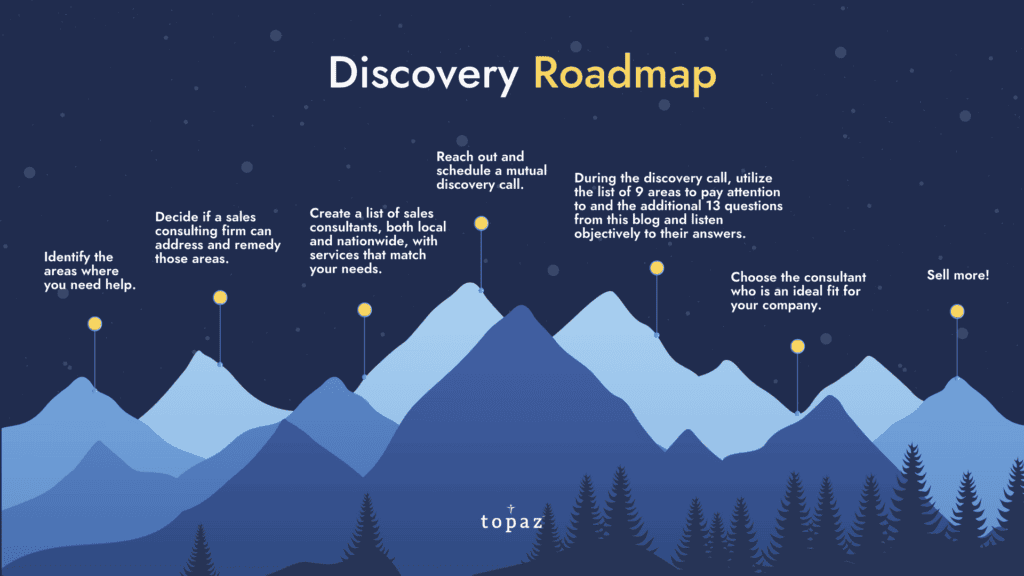
Many different sales consulting services are available, so choosing the right one for your business is essential. If you’re unsure which type of service is best for you, commit and decide to grow your sales. Contact sales consultants like us here at Topaz to see if we’re the right fit to address your business challenges.
Here is a discovery roadmap to follow
- Identify the areas where you need help.
- Decide if a sales consulting firm can address and remedy those areas.
- Create a list of sales consultants, both local and nationwide, with services that match your needs.
- Reach out and schedule a mutual discovery call.
- During the discovery call, utilize the list of 9 areas to pay attention to and the additional 13 questions from this blog, and listen objectively to their answers.
- Choose the consultant who is an ideal fit for your company.
- Sell more!
PRO TIP: When screening sales consultants, consider their sales process. The way they’re selling to you is how they will teach you to sell. Are they asking you the right questions for your business?
How to Vet a Sales Training Partner
If you’re shopping for sales training, you’re not just buying a program; you’re choosing a partner who will shape how your team sells for years to come. You must get past the glossy proposals and look for tangible signs of fit, capability, and integrity.
Start with these nine questions to ask yourself after every interaction with a potential sales training or consulting company. These will help you evaluate what they offer and how they operate. And yes, take note of the red flags along the way.
The Nine Questions to Ask Yourself
- How much do they know about your problems before they send a proposal?
If they’re pitching before they’ve probed, that’s a problem. A real partner will dig deep into your challenges before hinting at a solution. - How does their selling process feel?
The way they sell to you is exactly how they’ll train your team. Are they listening and curious, or pushing and pitching? - Have they asked where sales training fits among your other priorities?
Sales training isn’t a stand-alone event but must align with your bigger business picture. If they don’t ask, they don’t get it. - Through their curiosity, did you learn something you didn’t know you didn’t know?
Great questions spark new thinking. If you’re walking away with “aha” moments, you’re talking to someone who can shift your team’s perspective. - Do they think they must be an expert in your industry to help you?
Sales challenges are often universal. If they insist they have to be an industry insider, they may lean on telling instead of listening. - Do they apply pressure to get a yes?
There’s a difference between urgency and arm-twisting. The right partner balances respect for your process with a bias toward action. - Do they have a track record of success?
Case studies, client stories, measurable results—look for proof, not just promises. - Will you get personalized coaching or be just another client?
You want high-level strategy and hands-on coaching, not a revolving door of generic trainers. - Do they leave you with a better understanding of your problem?
If you end the conversation with more clarity, you’ve found someone worth considering.
Once you’ve run a potential partner through those filters, it’s time to turn the tables and ask them direct, intentional questions. These next ones will give you a deeper read on their philosophy, approach, and staying power.
The Thirteen Questions to Ask a Sales Consultant
- Who is an ideal client for you?
- What recommendations do you have for us to maximize the effectiveness of sales training?
- What is your belief system about sales?
- What types of sales training and coaching do you offer?
- What is your training model, and why do you deliver it that way?
- How do you help companies reach their full potential?
- What does ongoing support and advice look like as our business grows?
- How do you assess the strengths and weaknesses of a sales team and build a plan?
- How do you measure the effectiveness of your training? How do you track progress?
- How do you plan to communicate and collaborate with our sales managers and stakeholders?
- How will you support our team’s ongoing development and growth?
- Can you walk me through a typical coaching session and your feedback process?
- How do you follow up with the sales team after the coaching engagement?
Resource for CEOs: Sales Consulting Vetting Checklist
Hiring the wrong sales consultant is expensive. Not just in fees, but in lost time, stalled deals, and frustrated reps. To help you avoid that mistake, we created a Sales Training & Consulting Partner Vetting Checklist you can use during your evaluation process.
Inside, you’ll find the exact questions to ask and a scoring system to cut through the promises and see who can actually deliver. Use it live on your calls or meetings with consulting firms, and compare them side by side afterward.
This checklist helps you uncover:
- Whether a consultant builds trust or pushes for the quick yes
- If they can coach your team in real time on live deals, not just in theory
- How they diagnose problems before prescribing solutions
- Whether they adapt to your team’s culture or force a rigid playbook
- How they measure success and accountability
👉 Download the Sales Consulting Vetting Checklist here
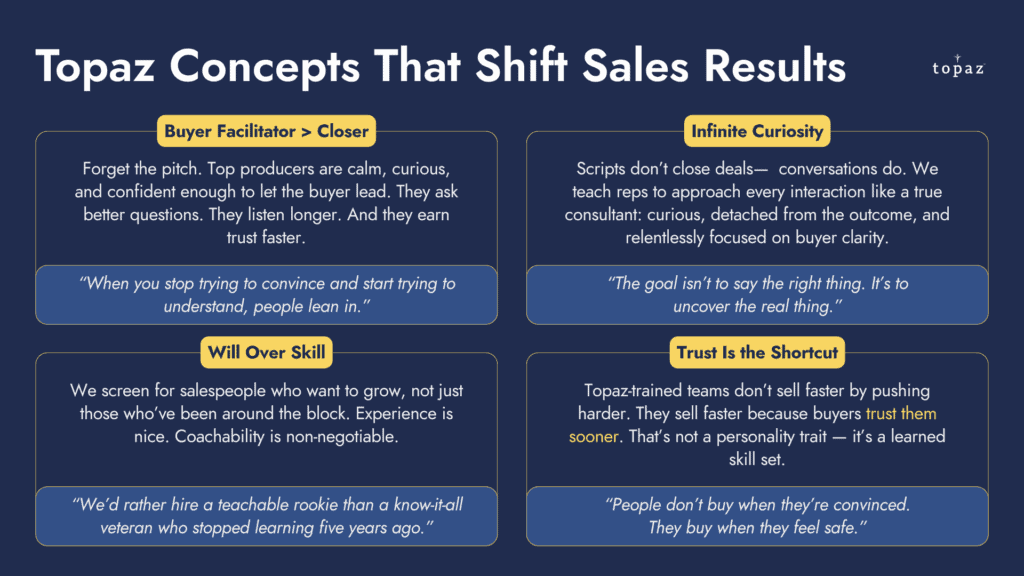
The right sales training partner will challenge your thinking, align with your values, and equip your team to sell in a way that works for your buyers and your business.
Bring us your lists and questions, and we’ll be more than happy to discuss your needs, determine the type of consulting services appropriate for you, and help you grow your sales!
FAQs
What services does a sales consulting firm provide?
Sales consulting firms often provide a blend of strategy development, sales training, leadership coaching, sales hiring support, operational process design, and technology integration. Each service is tailored to address a company’s specific challenges and goals, helping organizations strengthen how they develop, coach, and scale their sales teams.
How does a sales consultant identify issues and create a tailored strategy?
An effective sales consultant begins by conducting a thorough assessment of current performance, pipeline processes, and talent alignment. Based on these insights, the consultant designs a customized sales approach that may include hiring, leadership development, and training, all aligned with the company’s objectives and market realities.
When is the right time to hire a sales consultant?
It is often the right time to bring in a sales consultant when revenue growth is slowing, the sales process lacks clarity, hiring and retaining top performers is challenging, or the company needs to integrate new tools such as AI or adapt to hybrid selling environments.
Can sales consulting prepare teams for remote and hybrid selling?
Yes. Modern sales consulting goes beyond scripts and talk tracks. It equips teams to succeed in remote and hybrid environments by aligning sales strategies with changing buyer expectations and integrating technology in ways that strengthen human connection and performance.
How is the success of a sales consulting engagement measured?
Success is measured through clear improvements in key performance indicators such as win rates, deal speed, revenue growth, and employee engagement. It also includes the creation of lasting frameworks and behaviors, such as stronger coaching cultures and more effective hiring processes, that continue to deliver results over time.






